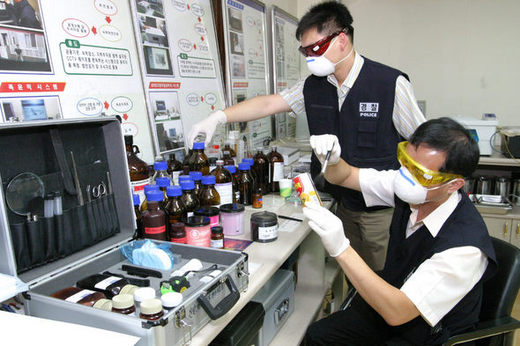 |
|
Police Crime Scene Investigation agents try to lift fingerprints from items brought from crime scenes.
|
Disease may be linked to chemicals used at crime scenes
Daejeon Police Station's Cheong Taek-gyu, Secheon Police Station's Chang Young-hyun, Suncheon Police Station's Sohn Yong-jeon, an officer at Busan Police Station only identified as Kwon, a Daegu Police Station sergeant identified as Lee, and a North Gyeongsang Province senior policeman, Kim: all crime scene investigators, with careers spanning anywhere from two to 10 years. They are also all victims of cancer. With a seeming increase in cancer among crime scene investigators, controversy is growing over whether the cause is because of chemicals used for identificatory purposes at crime scenes. The first three police officials, Cheong, Jang and Sohn, have already died from liver cancer. The remaining three are suffering from lung cancer or leukemia. The Chungnam University hospital doctor that treated Cheong said on Aug. 1, "Police sergeant Cheong had a higher susceptibility to cancer, as he had previously been diagnosed with cirrhosis. But his illness rapidly worsened due to his frequent exposure to hazardous materials, as well as his chronic job-related fatigue."Some 750 crime scene investigators are now working nationwide. Because no clear survey has been conducted about how many former and current crime scene investors have suffered from cancer, it is uncertain whether their working environment can be linked to the development of the disease. However, chemicals used for the identification of fingerprints are known to cause cancer and other lung-related diseases if inhaled. Silver nitrate, iodine, and zinc chloride, which are used to identify the starting point of a fire or the location of a blood stain, are categorized as 'hazardous materials in working environments' by laws governing industrial safety and public health. Nevertheless, crime scene investigators protect themselves with only gloves, clothes, a mask, and goggles. Crime scene investigators said that since the job is considered a less important one within the police force, police agencies have paid less attention in setting up countermeasures such as development of non-hazardous chemicals or improved safety equipment. There is a need to investigate any link between the profession and cancer, they said. Choi Byong-seok, a professor of chemistry at the Korea Advanced Institute for Science and Technology, said, "It doesn't make sense that police investigators don't even use an airtight transparent box while using chemicals categorized as hazardous materials by law." An official of the National Police Agency's investigation bureau said, "No confirmation has been made so far about the harmfulness of chemicals used for identification. However, we install air purifiers [in rooms where crime investigators are working] so that they can carry out their jobs safely."





